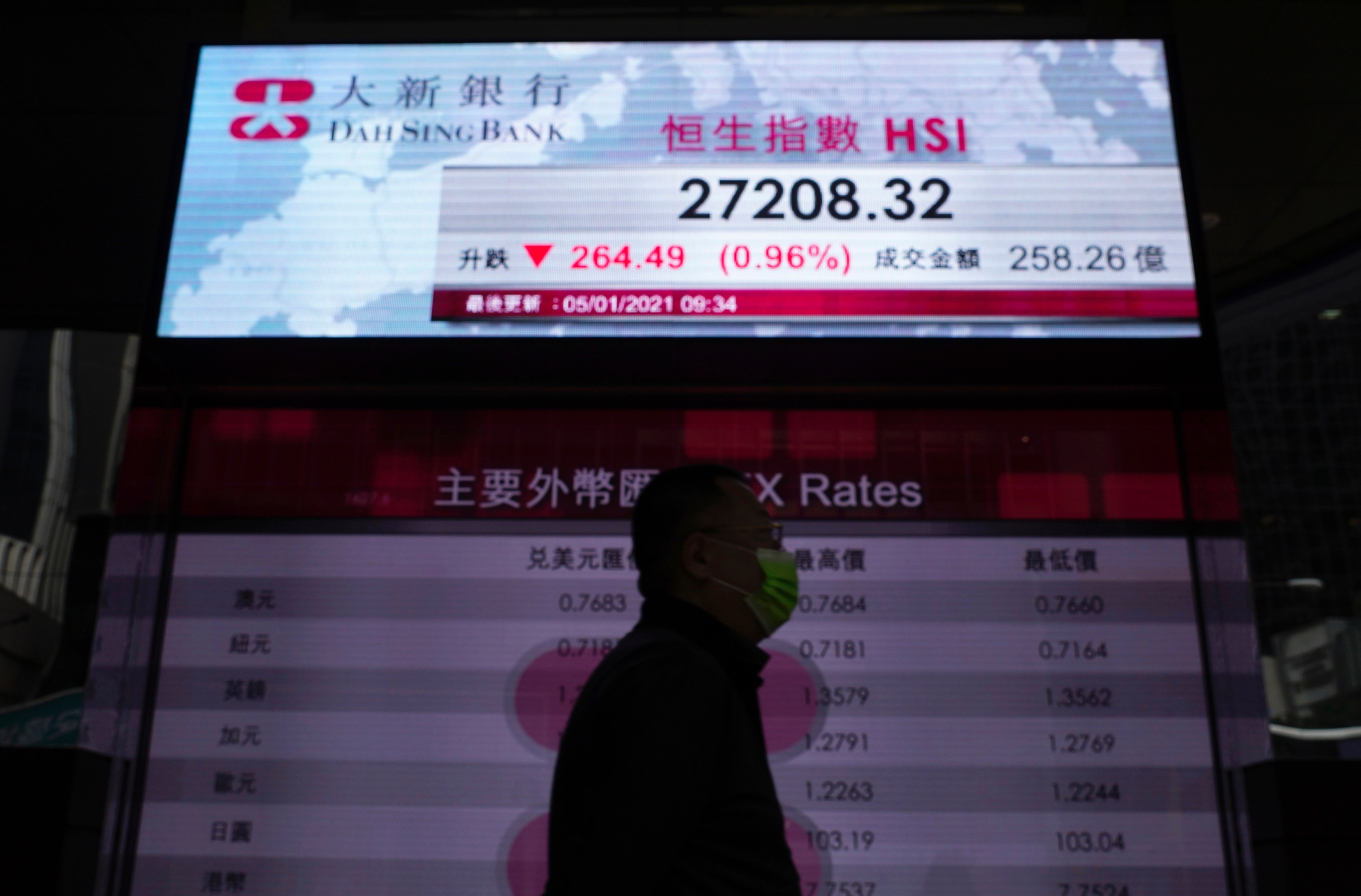Asian stocks mixed after Wall St retreat as virus cases rise
Asian shares are mixed as Japanese shares echoed pullbacks on Wall Street while other regional indexes recouped earlier losses amid continuing worries about surging coronavirus cases

Your support helps us to tell the story
From reproductive rights to climate change to Big Tech, The Independent is on the ground when the story is developing. Whether it's investigating the financials of Elon Musk's pro-Trump PAC or producing our latest documentary, 'The A Word', which shines a light on the American women fighting for reproductive rights, we know how important it is to parse out the facts from the messaging.
At such a critical moment in US history, we need reporters on the ground. Your donation allows us to keep sending journalists to speak to both sides of the story.
The Independent is trusted by Americans across the entire political spectrum. And unlike many other quality news outlets, we choose not to lock Americans out of our reporting and analysis with paywalls. We believe quality journalism should be available to everyone, paid for by those who can afford it.
Your support makes all the difference.Asian shares were mixed Tuesday, as Japanese shares echoed pullbacks on Wall Street while other regional indexes recouped earlier losses amid continuing worries about surging coronavirus cases.
Japan's benchmark Nikkei 225 shed 0.4% to 27,159.27 as the government was preparing to declare a state of emergency in Tokyo and several surrounding areas.
Australia's S&P/ASX 200 inched down less than 0.1% to 6,681.90. South Korea's Kospi gained 1.0% to 2,975.05, while Hong Kong's Hang Seng added 0.4% to 27,577.74. The Shanghai Composite climbed 0.5% to 3,521.75.
Japan's prime minister has said the government is considering declaring a state of emergency to help curb the spread of infections. The move is expected this week. Tokyo Gov. Yuriko Koike and the governors of Saitama, Chiba and Kanagawa asked the national government over the weekend to declare the emergency after the capital saw a daily record of 1,337 cases on New Year’s Eve.
U.S. stocks pulled back from their recent record highs, as big swings return to Wall Street at the onset of a year where the dominant expectation is for a powerful economic rebound to sweep the world.
“With the seven-day average new cases still hanging in the 600 K zone globally, few are likely expecting the market to be spared the resurgence of COVID-19 fears,” said Jingyi Pan, senior market strategist at IG in Singapore.
“Certainly, with the amalgamation of factors ranging from the U.K.’s third nationwide lockdown announcement, U.S. hospitalizations surging to a record and Tokyo mulling a state of emergency, these had all been evidence of the still raging pandemic inducing the risk-off mood to start the year for U.S. indices," Pan said.
The S&P 500, which ended 2020 at an all-time high, slid 1.5% after earlier dropping as much as 2.5%. It was the benchmark index's biggest decline since late October. Technology companies accounted for a big share of the sell-off, along with industrial, communication services, health care and other stocks. Only the S&P 500's energy sector managed to eked out a gain.
The selling comes as coronavirus cases keep climbing at frightening rates around the world, threatening to bring more lockdown orders that would punish the economy. The worsening numbers also raise the possibility that Wall Street has been overly optimistic about the big economic recovery it sees coming because of COVID-19 vaccines. Tuesday's upcoming runoff elections to determine which party controls the Senate may also be contributing to the volatility.
“We’ve got a wobbly start to the year here,” said Lindsey Bell, chief investment strategist at Ally Invest. “Investors are looking for a reason to lock in profits. The selling is probably a bit overdone.”
The S&P 500 fell 55.42 points to 3,700.65. The Dow Jones Industrial Average also fell from its record set last week, shedding 1.3%, to 30,223.89. At one point, it was down 724 points. The tech-heavy Nasdaq composite lost 1.5%, to 12,698.45.
Small company stocks, which have been notching solid gains in recent weeks, also fell. The Russell 2000 index of smaller companies dropped 1.5%, to 1,945.91.
Investors have been hoping that vaccines will allow daily life around the world to slowly return to normal. That's helped spark a recent recovery for stocks of travel-related businesses, smaller companies and other industries left behind for much of the pandemic.
In the United States, regulators have already approved two other vaccines. China last week gave the greenlight for its first domestically developed vaccine. Others are also being tested.
In energy trading, benchmark U.S. crude lost 20 cents to $47.42 a barrel in electronic trading on the New York Mercantile Exchange. It shed 92 cents to $47.62 on Monday.
Brent crude, the international standard, fell 26 cents to $50.83 a barrel.
In currency trading, the U.S. dollar slipped to 102.95 Japanese yen from 103.13 yen late Monday. The euro cost $1.2269, up from $1.2249.
___
AP Business Writers Stan Choe and Alex Veiga contributed.